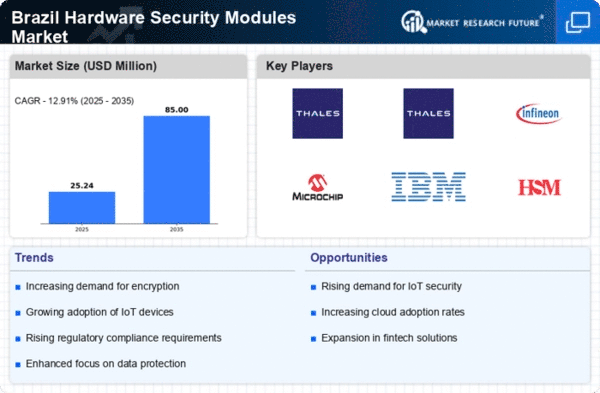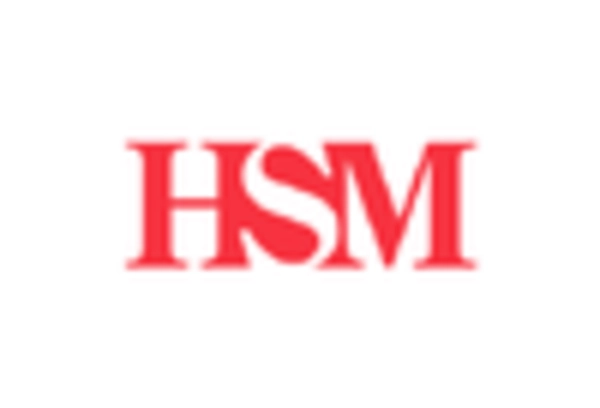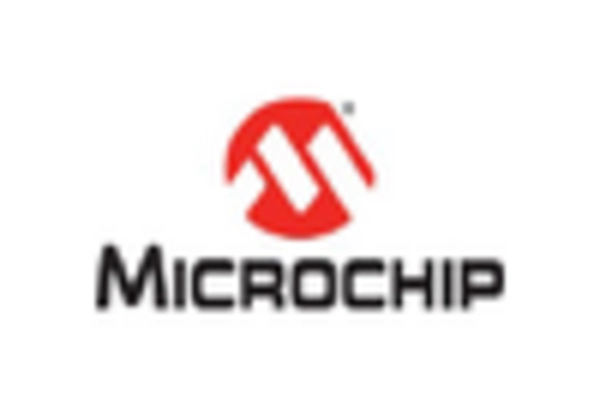Increasing Cyber Threats
The hardware security-modules market in Brazil is experiencing growth due to the rising frequency and sophistication of cyber threats. As organizations face an increasing number of data breaches and cyberattacks, the demand for robust security solutions is escalating. In 2025, it is estimated that cybercrime could cost businesses globally over $10 trillion annually, prompting Brazilian companies to invest heavily in hardware security modules. These modules provide a secure environment for cryptographic operations, ensuring that sensitive data remains protected. The urgency to safeguard digital assets is driving organizations to adopt advanced security measures. This trend is propelling the hardware security-modules market forward. This trend indicates a shift in corporate priorities towards comprehensive cybersecurity strategies, which are essential for maintaining consumer trust and regulatory compliance.
Rising Awareness of Cybersecurity
There is a notable increase in awareness regarding cybersecurity among Brazilian enterprises, which is positively impacting the hardware security-modules market. As businesses recognize the potential risks associated with inadequate security measures, they are more inclined to invest in advanced technologies. Surveys indicate that over 70% of Brazilian companies consider cybersecurity a top priority, leading to increased budgets for security solutions. This heightened awareness is driving organizations to adopt hardware security modules as part of their comprehensive cybersecurity strategies. The market is likely to benefit from this trend, as companies seek to enhance their security posture and protect sensitive information from evolving threats. The growing emphasis on cybersecurity awareness is expected to sustain the momentum of the hardware security-modules market in Brazil.
Growing Adoption of Cloud Services
The shift towards cloud computing is significantly influencing the hardware security-modules market in Brazil. As more businesses migrate their operations to the cloud, the need for secure data management solutions becomes paramount. In 2025, it is projected that the cloud services market in Brazil will reach approximately $10 billion, highlighting the increasing reliance on cloud infrastructure. Hardware security modules play a crucial role in securing cloud environments by providing encryption and key management services. This growing adoption of cloud services is likely to drive demand for hardware security modules, as organizations seek to protect their data from unauthorized access and breaches. The integration of these modules into cloud solutions is expected to enhance overall security, making them an essential component of modern IT strategies.
Regulatory Compliance Requirements
In Brazil, stringent regulatory frameworks are shaping the hardware security-modules market. The General Data Protection Law (LGPD) mandates that organizations implement adequate security measures to protect personal data. Compliance with such regulations is not merely a legal obligation but also a competitive necessity. Companies that fail to adhere to these regulations may face substantial fines, which can reach up to 2% of their revenue. As a result, Brazilian businesses are increasingly turning to hardware security modules to ensure compliance and protect sensitive information. This trend is likely to drive market growth, as organizations seek to avoid penalties and enhance their data protection strategies. The hardware security-modules market is positioned to benefit from the ongoing emphasis on regulatory compliance. This compliance is expected to remain a key driver in the coming years.
Technological Innovations in Security Solutions
Technological advancements are playing a pivotal role in shaping the hardware security-modules market in Brazil. Innovations such as quantum cryptography and advanced encryption algorithms are enhancing the capabilities of security solutions. As organizations seek to stay ahead of cyber threats, they are increasingly adopting cutting-edge technologies that hardware security modules offer. The market is witnessing a surge in demand for modules that provide enhanced performance and security features. In 2025, it is anticipated that the hardware security-modules market will grow at a CAGR of approximately 15%, driven by these technological innovations. This trend suggests that Brazilian companies are prioritizing the integration of state-of-the-art security solutions to safeguard their digital assets, thereby fostering a competitive edge in the market.















